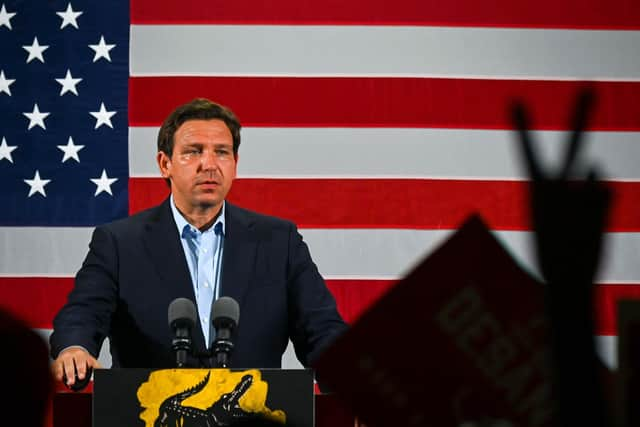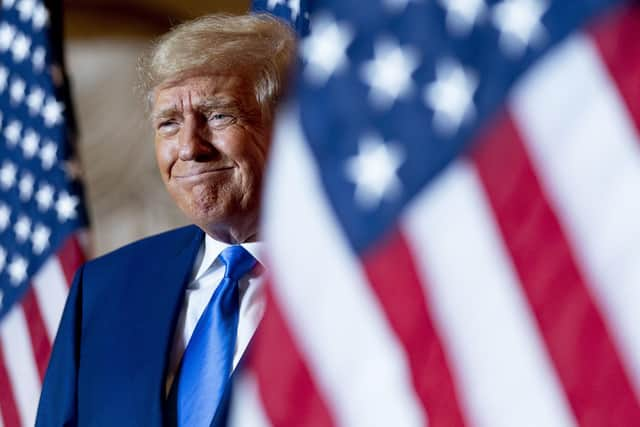US elections: 'Red mirage' in US midterms leaves Republicans questioning Donald Trump with Ron DeSantis winning influence
But in the end, the predictions of a one-sided election were wide of the mark. In the words of Wen-Wen Lindroth, the UK chair of Democrats Abroad, the official organisation of the Democrat party for US citizens living overseas, it was more like a ‘red mirage’.
The results of the US midterms so far have produced many talking points. And with the vote in Georgia going to a run-off next month, it will be some time before the final picture is clear. But one overarching issue that is being discussed far and wide is what it all means for Donald Trump’s political future.
Advertisement
Hide AdAdvertisement
Hide AdMany observers regarded the midterms as a bellwether of the former US president’s standing among his party and, indeed, in the country at large. The fact the Republican dominance many predicted did not come to pass has raised searching questions of the party, and the divisive figure in Trump looking to follow in Grover Cleveland’s footsteps by serving two non-consecutive terms in the White House.
For years, the party has been synonymous with Trump and his Make America Great Again brand. But the tensions between the two are growing.
So how do the midterm results feed into that trend, and what impact will they have on the 2024 presidential election? The incumbent, Biden, has already announced that he will be running again. What about Trump?
Barring a drastic U-turn, it seems inevitable that he too will be standing, regardless of the disappointment of last week’s results. In the days and weeks leading up to the midterms, the 76 year-old came as close as he has yet to confirming he will run again, dropping one thinly veiled hint after another.
He told a raucous crowd in Iowa that he would “very, very, very probably do it again,” and in Pennsylvania last weekend, he said “he’d like to do it”, drawing cheers from his supporters. According to Axios, Trump could make his formal declaration as soon as this week, and the man himself told a crowd in Ohio there would be a “big announcement” this Tuesday.


In truth, the tell-tale sign came far earlier in the form of the millions of dollars Trump’s political action committees have raised from supporters in the run up to the midterms. That money was used to support a slew of Republican candidates endorsed by Trump.
In theory, it was a way for him to consolidate his power base within the party. But in reality, the electorate had other ideas.
Trump gave his backing to some high-profile Senate candidates, only to see several, such as Dr Mehmet Oz, running in Pennsylvania, and Tudor Dixon, standing in Michigan, rejected at the polls.
Advertisement
Hide AdAdvertisement
Hide AdIndeed, in areas where Trump’s favoured candidates were up against incumbent Democrats, the Republican vote share declined by 1.2 percentage points compared to the presidential election two years ago. Where the GOP candidate was not endorsed by Trump, the party’ vote share increased by seven percentage points.


The Trump camp experienced similar problems in the race for the House of Representatives. Those counties with candidates backed by Trump saw the Republican vote share increase by just 2.1 percentage points compared to 2020. In counties where other Republicans stood, however, the spike was a resounding eight percentage points.
Such stark contrasts have been seized upon by some observers who say Trump is now a hindrance to Republican prospects. David Urban, a Republican commentator, lobbyist, and former advisor to Trump, said his party has “followed Trump off the side of a cliff” and summarised its strategy to date: “Live by Trump, die by Trump.”
Sarah Matthews, a one-time deputy press secretary to the Trump administration, went further. She said: “Election night was the biggest indicator that Donald Trump should not be the Republican nominee in 2024. He cost Republicans winnable seats by boosting poor quality candidates.”
The growing popularity of such views spell trouble for Trump. The biggest challenge he faces to becoming president again is from within the GOP itself, which is now asking legitimate questions over whether it should be seeking out a new candidate for 2024.
In that respect, the midterm results are significant. The landslide victory of Ron DeSantis, the Republican governor in Florida, is the one result that will arguably have the biggest impact on 2024, and in particular, Trump’s future.
The swaggering and aggressive style of the younger man has won him many supporters in the GOP, and he is widely regarded as the figure most likely to challenge Trump for the Republican nomination. Many analysts believe that is where DeSantis has his sights set, a hypothesis supported by the fact that he repeatedly refused to commit to serving a full four-year term during a governor’s debate last month.
The 44 year-old is not averse to using Trump-style dog whistles – earlier this year, for example, he set up a so-called ‘office of election crimes and security’ to scrutinise alleged voting offences. Unlike Trump, however, he has shown a willingness to reach across the political divide.
Advertisement
Hide AdAdvertisement
Hide AdSome recent opinion polls in Florida have put DeSantis ahead of Trump, and relations between the two men have broken down into playground taunts; at a rally in Pennsylvania, the former president referred to his young rival as ‘Ron DeSanctimonious’.
Greg Swenson, chair of Republicans Overseas UK, described the midterms as a “real missed opportunity” for his party. He said there was scrutiny of Trump’s influence – and reflection on the strong performance of DeSantis
“The polls actually favoured Republicans, and were wrong,” he said. “Normally, they favour Democrats, and it’s Republicans that are surprised, but it’s the other way around.
“The candidates that Trump supported and advocated did not really do well. It’s the candidates that have been in seats and have actually articulated a vision, or done it themselves in office, like Greg Abbott, the governor of Texas, and especially Ron DeSantis.
“He’s obviously got an appeal to the common-sense voter. You’ve had a massive number of people moving to Florida, and one of the reasons is because he’s done so well there. Now, Florida’s a solid red state.”
Comments
Want to join the conversation? Please or to comment on this article.